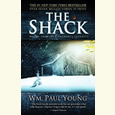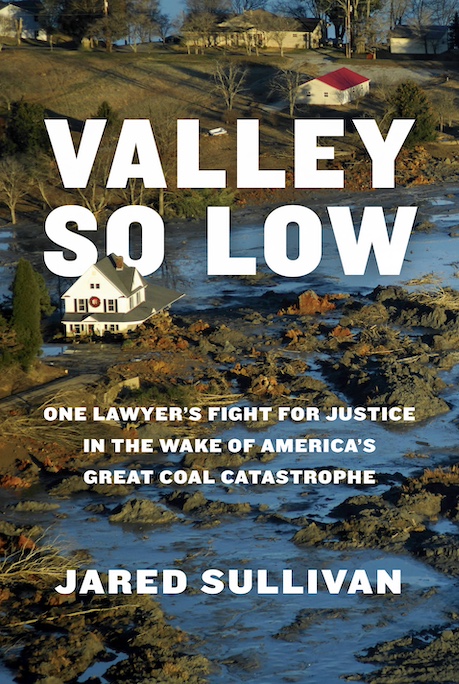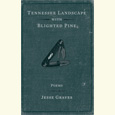The Particular Art of Magical Realism
Aimee Bender talks with Chapter 16 about her work
A woman’s lover devolves into a tadpole. A girl has a hand made of fire. A guy brings a tiny man home to keep as a pet. Two pumpkinheads give birth to an ironhead. Such are the delightfully odd premises behind the fiction of Aimee Bender, a modern fabulist and sharp prose stylist who sprinkles fairy-tale dust into contemporary settings and conflicts. Her latest novel, The Particular Sadness of Lemon Cake, is no exception, with a central conceit that’s fetchingly simple and surreal: one day, a young girl named Rose Edelstein bites into a forkful of her mother’s lemon cake with chocolate frosting, and finds that she can “taste” her mother’s feelings in the dessert.
As the book’s title suggests, the discovery is not so sweet: “I could absolutely taste the chocolate, but…it seemed that my mouth was also filling with the taste of smallness, the sensation of shrinking, of upset, tasting a distance I somehow knew was connected to my mother,” Bender writes. Rose’s mother is secretly adrift in her marriage, searching for something to brighten her life. And from that point on, Rose cannot take a bite of food without sensing the cook’s emotional state in each mouthful. As she grows up and learns to cope with this often maddening ability, she discovers that her older brother, Joseph—a brilliant, science-obsessed loner—may have a mysterious quality of his own.
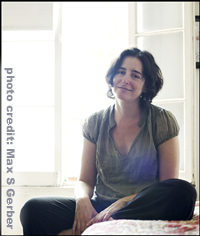 The novel broadens in unexpected ways, beyond the curious dazzle of Rose’s psychic experience of food, as Bender “plumbs an emotionally crippled family with power and authenticity,” as Publishers’ Weekly puts it: “[T]his coming-of-age story makes a bittersweet dish, brimming with a zesty, beguiling talent.” Bender talked with Chapter 16 about the book, food as metaphor, and what compels her to write magical realism.
The novel broadens in unexpected ways, beyond the curious dazzle of Rose’s psychic experience of food, as Bender “plumbs an emotionally crippled family with power and authenticity,” as Publishers’ Weekly puts it: “[T]his coming-of-age story makes a bittersweet dish, brimming with a zesty, beguiling talent.” Bender talked with Chapter 16 about the book, food as metaphor, and what compels her to write magical realism.
Chapter 16: Food has been so politicized, has become such a hot topic in recent years. And not surprisingly, a lot of the discussion around The Particular Sadness of Lemon Cake has revolved around its food theme. But it seems less about food and eating than it does about forgiveness and family ties. In a way, food was less central than I expected it to be.
Bender: You’re right; because there’s so much talk around the subject of food, it has been the way to enter the book. But I don’t think of this as a food book at all. Food is the entry point, and I think because of the accessibility of that, that’s how it has been framed. I was thinking of food more as a metaphor, as a way to talk about the dynamic between people.
Chapter 16: There’s a growing emphasis these days on knowing where our food comes from—to know the farmer whose hands pulled it from the ground, for example. But your main character, Rose, seeks a kind of refuge in processed food; it’s what she is able to enjoy most. For her, it’s best to have as few real human hands on her food as possible.
Bender: Right. Well, processed food is convenient and cheaper, but there have also got to be psychological reasons that we’re drawn to it. I do feel like there’s something about the familiarity of a bag of Cheetos that addresses something. It’s comforting, even if it’s bad.
Chapter 16: You’re known as a writer of magical realism, or a fabulist. What is it about that kind of storytelling that appeals to you?
Bender: For me, the goal is to capture some kind of feeling or experience that I cannot articulate for myself any other way. In order to get at that feeling, I want to use whatever tool I can. And often, looking at it through the shimmer of metaphor or a skewed vision is, paradoxically, a more direct way for me to think about or articulate something about an experience. I just don’t ever feel like I can have an experience or observation and then just set it on the page. It doesn’t transfer to language that cleanly. For me, magical storytelling becomes a way to make concrete something that I can then look at a little more closely.
Chapter 16: So can you break down the stories and say, “Well, this magical element really means this for me”? Is it something that can be decoded?
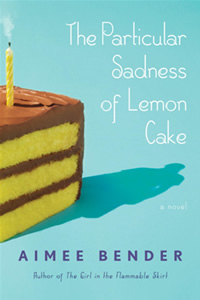 Bender: Occasionally I’ll be able to make that one-to-one ratio, but it’s rarely that simple. When [reading literature] becomes a puzzle or a game of someone matching symbol to meaning, then it’s almost like you can dismiss the story—and this is true for fiction, film, painting, anything. It becomes a way to know it and be done with it. Donald Bartheleme says his desire for art is that it should invite analysis but also push it away. A story should invite you to break it down, but you should never be able to break it down fully. I love that idea.
Bender: Occasionally I’ll be able to make that one-to-one ratio, but it’s rarely that simple. When [reading literature] becomes a puzzle or a game of someone matching symbol to meaning, then it’s almost like you can dismiss the story—and this is true for fiction, film, painting, anything. It becomes a way to know it and be done with it. Donald Bartheleme says his desire for art is that it should invite analysis but also push it away. A story should invite you to break it down, but you should never be able to break it down fully. I love that idea.
Chapter 16: I thought it was interesting the way the focus of the book shifted from Rose’s experience of intuiting emotion through food to her brother and his own strange “skill.” Can you talk a little bit about that turn?
Bender: I was writing about Rose and food, and I got about ninety pages in that way. Then the story slowed down but didn’t feel resolved. When I finished those ninety pages, Rose was in a lot of distress. She was hovering there, and I didn’t know what might be a catalyst for her. And in my mind the catalyst became how she feels when she sees how deeply her brother will remove himself. It felt like the center of the book started to become less Rose, and more the relationship between Rose and Joseph—how are they more alike than they appear. And the idea, too, of various kinds of sensitivities, the ways they are helpful and the ways they are hurtful.
Chapter 16: Rose keeps the experience of tasting emotion through food mostly to herself, especially after one disastrous attempt to tell her mother about it. That seemed very believable, but it also seemed like a tricky thing to pull off narratively.
Bender: That may be part of the reason that I needed that shift to her brother. I felt like something had to shake her. Rose isn’t a confrontational kid. She’s not one to take adults and shake them until they hear her. It felt important to me that that was her character, so it did mean that there had to be shifts happening on a kind of subterranean level within the family. They wouldn’t be talking it through in a more overt way.
Chapter 16: Rose is compassionate and gentle, on the quiet side, and I love that she’s sort of an outsider at school but not in an angsty way. She’s both very believable and surprising. She’s also very different from many of the female characters in your other work, who sometimes act in audacious or surprisingly saucy ways. In fact, most of the characters in this book are quite likeable—even Rose’s father, who’s so distant, is affable in his own way. Did you set out to create characters that were different from your previous ones?
Bender: The fiction writer’s canvas is everybody, so it’s interesting to me to write about characters who are really trying to do things in a good way, and having their own struggles, and characters who are acting out, who do all sorts of things that I’m too inhibited to do in my life. There’s real joy in that. But I guess that I’ll just follow whatever seems to be working on the page. So in a given year, there might be a whole bunch of unsympathetic characters. And then in the next year, everyone might be more loving and having more subtle problems. The only thing that guides me, really, is an interest in paragraphs I want to follow. If the interest is there, I’ll follow whatever shows up.
Chapter 16: Rose’s father has such a strong phobia of hospitals that he’s unable to be present for the birth of his children. Can you say a bit about that idea?
Bender: I think there was something about the idea of hospitals, what do they represent to people, and what would happen if someone really felt afraid of hospitals and his wife was giving birth: How would he do it? [Rose’s father] really could not do it. But he wanted to be as close as he possibly could. It also felt like another way to represent a tragic gap in her parents’ relationship. It seemed so lonely for both of them.
Chapter 16: You have two story collections and two novels under your belt; do you prefer one form over the other?
Bender: I think I feel a little more at ease with short-story form, because it’s where I started, and sometimes the stories I write are really short. But writing novels has changed the way I think about writing stories. They affect each other. I think of it sort of like when you have a pair of jeans and then you wash them, and then they fit for a while, and then they get baggy. After writing a novel, writing a story can feel sort of baggy—the pace is different, so it takes a little adjusting. I do like to work on both at the same time, basically because it takes the pressure off. I work on many things at once. In this sort of ADD world, it just seems like to focus on any one thing for many hours is hard.
Chapter 16: You teach fiction writing at the University of Southern California. Are you noticing any trends in your students’ writing?
Bender: Five years ago, there was a whole kind of Eggers/Bartheleme thrust toward funny, fresh, very McSweeney’s-inspired work. Right now I think there’s a lot of interest in [Roberto] Bolano. And zombies.
Aimee Bender will discuss her work at Vanderbilt University in Nashville on October 28 at 7 p.m. in Buttrick Hall, Room 102.

